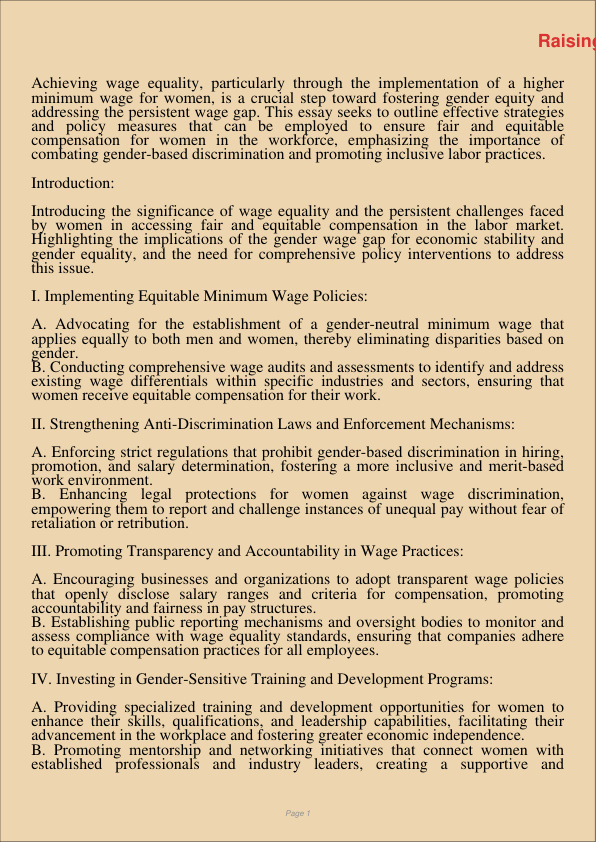Raising The Minimum Wage For Women How Should Wage Eqaulity Be Achieved
Dec 31, 2023
wage eqaulity
minimum wage
Philosophy
Biology

Achieving wage equality, particularly through the implementation of a higher minimum wage for women, is a crucial step toward fostering gender equity and addressing the persistent wage gap. This essay seeks to outline effective strategies and policy measures that can be employed to ensure fair and equitable compensation for women in the workforce, emphasizing the importance of combating gender-based discrimination and promoting inclusive labor practices.
Introduction:
Introducing the significance of wage equality and the persistent challenges faced by women in accessing fair and equitable compensation in the labor market. Highlighting the implications of the gender wage gap for economic stability and gender equality, and the need for comprehensive policy interventions to address this issue.
I. Implementing Equitable Minimum Wage Policies:
A. Advocating for the establishment of a gender-neutral minimum wage that applies equally to both men and women, thereby eliminating disparities based on gender. B. Conducting comprehensive wage audits and assessments to identify and address existing wage differentials within specific industries and sectors, ensuring that women receive equitable compensation for their work.
II. Strengthening Anti-Discrimination Laws and Enforcement Mechanisms:
A. Enforcing strict regulations that prohibit gender-based discrimination in hiring, promotion, and salary determination, fostering a more inclusive and merit-based work environment. B. Enhancing legal protections for women against wage discrimination, empowering them to report and challenge instances of unequal pay without fear of retaliation or retribution.
III. Promoting Transparency and Accountability in Wage Practices:
A. Encouraging businesses and organizations to adopt transparent wage policies that openly disclose salary ranges and criteria for compensation, promoting accountability and fairness in pay structures. B. Establishing public reporting mechanisms and oversight bodies to monitor and assess compliance with wage equality standards, ensuring that companies adhere to equitable compensation practices for all employees.
IV. Investing in Gender-Sensitive Training and Development Programs:
A. Providing specialized training and development opportunities for women to enhance their skills, qualifications, and leadership capabilities, facilitating their advancement in the workplace and fostering greater economic independence. B. Promoting mentorship and networking initiatives that connect women with established professionals and industry leaders, creating a supportive and empowering environment that encourages women to pursue higher-paying and leadership positions.
Conclusion:
Emphasizing the importance of collaborative efforts among policymakers, businesses, and civil society to implement comprehensive and sustainable strategies for achieving wage equality for women. Reiterating the significance of addressing systemic barriers and gender biases within the labor market to create a more inclusive and equitable work environment for all. Proposing a collective commitment to promoting wage parity as a fundamental pillar of social justice and economic progress, ensuring that women receive the recognition and compensation they deserve for their invaluable contributions to the workforce and society.